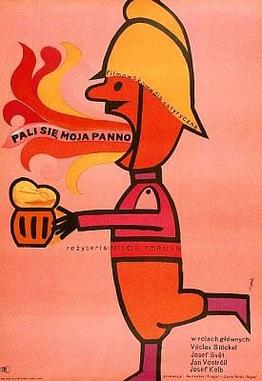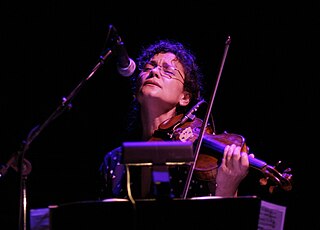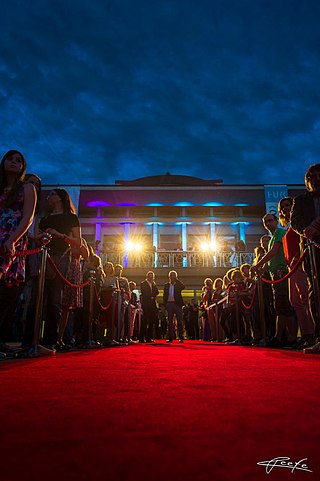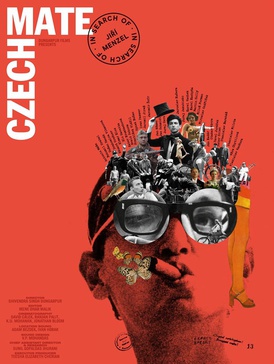Related Research Articles

The Czechoslovak New Wave is a term used for the Czechoslovak filmmakers who started making films in the 1960s. The directors commonly included are Miloš Forman, Věra Chytilová, Ivan Passer, Pavel Juráček, Jiří Menzel, Jan Němec, Jaromil Jireš, Evald Schorm, Hynek Bočan, Juraj Herz, Juraj Jakubisko, Štefan Uher and others. The movement was sometimes called the "Czechoslovak film miracle".

AS Trenčín is a Slovak sports club in the town of Trenčín, most known for its football department. The first team currently plays in the Fortuna Liga after winning the 2010–11 Slovak First League. The club plays its home games at the Štadión na Sihoti with a capacity of 10,000 spectators.
Vladimír Godár is a Slovak classical and film score composer. He is also known for his collaboration with the Czech violinist, singer, and composer Iva Bittová. As an academic, he is a writer, editor, and translator of books on historical music research. He has been active in reviving the music and reputation of 19th-century Slovak composer Ján Levoslav Bella.

Iva Bittová is a Czech avant-garde violinist, singer, and composer. She began her career as an actor in the mid-1970s, appearing in several Czech feature films, but switched to playing violin and singing in the early 1980s. She started recording in 1986 and by 1990 her unique vocal and instrumental technique gained her international recognition. Since then, she has performed regularly throughout Europe, the United States and Japan, and has released over eight solo albums.

The cinema of Slovakia encompasses a range of themes and styles typical of European cinema. Yet there are a certain number of recurring themes that are visible in the majority of the important works. These include rural settings, folk traditions, and carnival. Even in the field of experimental film-making, there is frequently a celebration of nature and tradition, as for example in Dušan Hanák's Pictures of the Old World. The same applies to blockbusters like Juraj Jakubisko's A Thousand-Year Old Bee. The percentage of comedies, adventures, musicals, sci-fi films and similar genres has been low by comparison to dramas and historical films that used to include a notable subset of social commentaries on events from the decade or two preceding the film. One of them, Ján Kadár's and Elmar Klos' The Shop on Main Street, gave Slovak filmmaking its first Oscar. Children's films were a perennial genre from the 1960s through the 1980s produced mainly as low-budget films by Slovak Television Bratislava. The themes of recent films have been mostly contemporary.

The Sun in a Net is a 1963 film that became a key film in the development of Slovak and Czechoslovak cinema from the mandated Socialist-Realist filmmaking of the repressive 1950s towards the Czechoslovak/Czech New Wave and socially critical or experimental films of the 1960s marked by a gradual relaxation of communist control. The Sun in a Net received multiple votes in a wide survey of Czech and Slovak film academics and critics in the late 1990s asking them for their lists of the 10 best films in the history of filmmaking in the former Czechoslovakia.

She Grazed Horses on Concrete is a film which lays out serious topics that include a woman's capacity to hold her own in society, sexual mores, and abortion, and balances them with comedy and irony in proportions that instantly made it one of the biggest domestic blockbusters in Slovak cinema.
Peter Pišťanek was a Slovak writer. He began publishing short stories in the 1980s, and his first novel, Rivers of Babylon, came out in 1991. This was adapted into a film of the same name in 1998 by Vladimir Balco. The book was followed by the sequels Wooden Village (1994) and End of Freddy (1999). Two more of Pišťanek's works were adapted to film, both by Juraj Nvota: his short story "Muzika", which won Best Film at the Sun in a Net Awards in 2008, and his novel Rukojemník – Lokomotívy v daždi, in 2014. Pišťanek committed suicide on 22 March 2015.
Dušan Hanák is a Slovak film director.
I Love, You Love is a 1989 Czechoslovak drama film directed by Dušan Hanák. It was entered into the 39th Berlin International Film Festival where Hanák won the Silver Bear for Best Director.

Art Film Fest, previously known as Artfilm, is an annual international film festival founded in Trenčianske Teplice, Slovakia in 1993, shortly after the dissolution of Czechoslovakia. The first event was held on 14 June 1993, under the auspices of UNESCO. It is the longest continuously running international film festival in the country.

"V slepých uličkách" is a duet by Miro Žbirka and Marika Gombitová released on OPUS in 1980.

Jozef Heriban is a Slovak writer, scenarist and film director. He devotes his time to literature and film. He is the former President of the Slovak PEN Centre, a Vice-President of the Board of the Slovak Audiovisual Fund and a member of the Slovak Film and Television Academy. He was married to well-known television talk show host and former Director of the Slovak Institute in Vienna Alena Heribanová and has two daughters, writer and journalist Tamara Šimončíková Heribanová and marketing and PR manager Barbara Jagušák.
Hanák or Hanak is a Czech and Sudeten German surname. The name is also used in Austria, Hungary and Slovakia. Hanak is an inhabitant of Hanakia.

Milena Hübschmannová (1933-2005) was Czech professor of Romani studies at Charles University of Prague. She was one of the leading experts on Romani society and culture, as well as Romani language. She founded the academic study program on the Roma at Charles University and actively opposed their assimilation into the greater culture. She wrote a Romani-Czech and Czech-Romani dictionary and collected many of the stories of the Roma, translating them for posterity. The program she founded was the first program worldwide to offer a degree program to undergraduates in Romani Studies.

CzechMate: In Search of Jiří Menzel is a 2018 documentary film directed by Shivendra Singh Dungarpur that focuses on the life and work of the Czechoslovak New Wave film director Jiří Menzel, and also explores the Czech and Slovak New Wave cinema of the 1950-70s.
Ordinace v růžové zahradě 2 is a Czech medical drama and soap opera broadcast from 2005 to 2021 on TV Nova channel and from 2021 on Voyo.cz. The soap opera plot is about a hospital in fictive town of Kamenice located in Hradec Králové District, its employees and their life stories, families and relationships.
Alexander Strelinger was a Slovak cinematographer and photographer. After graduating from the Film and TV School of the Academy of Performing Arts in Prague in 1960, he became a cinematographer for documentary films in Bratislava, working most notably on the films Človek a hra (1969), Ľudovít Fulla (1972), Terchovská muzika (1984), and Pavol Socháň (1987) with Martin Slivka, the films Nemecká (1974) and Len lístok poľnej pošty (1977) with Peter Solan, the films Analógie (1965), Impresia (1966), and Variácie kľudu (1966) with Dušan Hanák, and the films Slovenský raj (1966), Črty z Indie (1967), Hr. Peklo (1967), and Mimoriadne cvičenie (1971) with Vladimir Kubenko. He was awarded a lifetime achievement award at the Kamera Awards in 2008. He also taught documentary filmmaking at the Academy of Performing Arts in Bratislava for several years before his death in 2022.
Events from the year 1989 in Czechoslovakia. The year was marked by the Velvet Revolution, which started with student demonstrations on 17 November. It ended with the resignation of the President and Prime Minister, the end of the dominance of the Communist Party and the election of the Václav Havel, the first President of free Czechoslovakia.
References
- ↑ Anne E. Kellogg, "Dušan Hanák: Rosy Dreams (Ružové sny), 1976."
- ↑ Dina Iordanova, Cinema of the Other Europe: The Industry and Artistry of East Central European Film. New York, 2003.
- 1 2 3 4 5 Votruba, Martin. "Rosy Dreams (Ružové sny)". Slovak Studies Program. University of Pittsburgh. Retrieved 2010-06-18.
- ↑ FAMU
- ↑ Koliba
- ↑ Václav Macek, "From Czechoslovak to Slovak and Czech Film."
- ↑ Caryn James, "A Film Festival With the Spirit of Margaret Mead." NYT, 1989.
- ↑ "Dušan Dušek." Literature in Context, Universität Wien.
- 1 2 VŠMU
- ↑ Peter Hames, "Demanding work, but always creative: Ondrej Šulaj and Dušan Dušek interviewed."
- ↑ Václav Macek, Dušan Hanák. Bratislava, 1996.
- ↑ Tom Gross, "Milena Hubschmannova." The Guardian, 2005.
- ↑ "Věra Bílá." Rombase, Karl-Franzens-Universität, Graz
- ↑ Denisa Havrľová, "S Idou Kelarovou: O čom tá 'rómska' hudba vlastne je?!" Khamoro, 2000.
- ↑ Michal Frank, "Našli sme hviezdu svetového formátu Věru Bílú - žije v Prešove!" Korzár, 2005.
- ↑ Slovenské komorné divadlo (formerly Divadlo SNP)
- ↑ Victor Verney, "George Mraz & Iva Bittova: Moravian Gems." All About Jazz, 2007
- ↑ Martin Votruba, "Historical and Cultural Background of Slovak Filmmaking."
- ↑ DVD insert
- ↑ Jan Lukeš, "Foreword to Dušan Hanák," 3 scénáře. Prague, 2005.
- ↑ DVD edícia denníka SME a Slovenského filmového ústavu